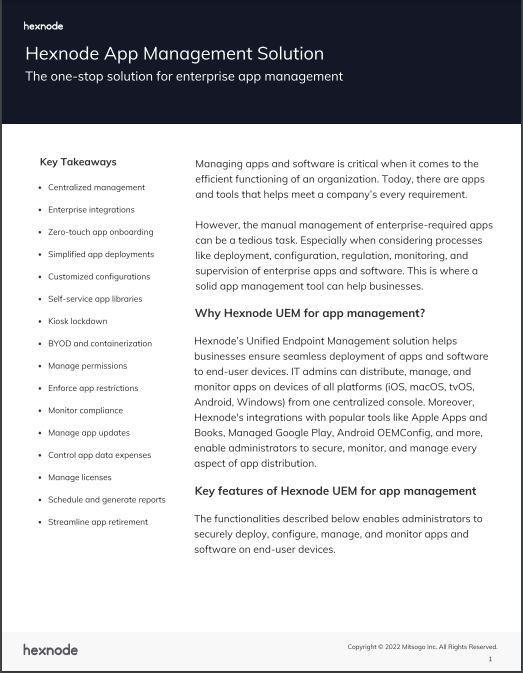Where would the world be if there were no apps? The question does throw you off-kilter, doesn’t it? After all, they do make our lives a whole lot easier. For anything and everything under the sky, you have an app. Even the most basic function of calling someone from a phone is now done using an app.
Websites are good, they are great even! However, the convenience an app offers is something entirely different. With apps, life is easier. After the initial hang up over installing the app, it’s all about just clicking away to get your things sorted. So, you see, apps are great, all you have got to do is install them. So, let’s do exactly that.
Why is there a need for remote app deployment?
Not just for bulk deployment, but in the case of all app installations, organizations have certain rules and regulations regarding apps. Most organizations won’t allow their employees to use all apps there are in the world. There will be certain restrictions on it. Similarly, employees will be restricted in terms of the source of app installation too.
So, what most companies would do is, they will remotely deploy apps to end-user devices using an app management tool rather than letting the employees do it themselves. This has a lot of benefits:
- Increased productivity: Since the IT team has control over what app is being used, the employees won’t use any unnecessary apps and waste any time.
- Increased security: As the company sends all the apps, no harmful or malicious apps will be installed on the employee’s devices, hence reducing the chances of cyber-attacks through apps. Also, apps can be updated remotely, making it easier to deliver security patches on time.
- Control over data usage: Downloading and installing apps consumes a lot of data, especially non-work apps like games and video streaming platforms. By having control over it, organizations can control the unnecessary wastage of data.
- Save the IT team’s time: Organizations still can do all of this without a remote app deployment tool, but the IT team will have to manually do the app installation process on each device, which will take a lot of time.

So, yah having a remote app management or app deployment tool is essential if you want to have good control of how employees use the enterprise devices.
What is silent app installation?
The greatest concern with conventional remote app distribution tools is that pushing apps at irregular times could have a grave impact on work. Does this mean that workers will be off the job for longer? Yes!
Well, that’s where silent app installation comes into play. What is it you might ask? We gotcha covered.
Silent app installation is where app installation is initiated remotely without any user intervention. Here the app gets installed in the background without interfering with the user’s work. The IT team can silently install a new app on their smartphone while they are at work.
Only when they look at the app catalog or get out of the app they were using would the users know that a new app has been installed on their device. This answers the question, won’t remote app deployment affect employees’ work?
How can you install apps silently using Hexnode?
Well, as we mentioned earlier, you need a tool to get started with remote app distribution. Hexnode is an award-winning Unified Endpoint Management (UEM) tool that just so happens to offer an all-around app management feature.
With Hexnode, you can distribute, manage and revoke apps across multiple platforms like Android, iOS, macOS, Windows and more.

Featured resource
Hexnode App Management Solution
Download the datasheet to learn how Hexnode’s App Management solution helps businesses ensure seamless deployment, configuration, regulation, monitoring, and supervision of enterprise apps and software on end-user devices.
Download the datasheetAnd silent app installation is possible for all the above-mentioned platforms. To do this the first thing you have to do is, enroll the devices in the Hexnode management portal. Once that is done you can start distributing apps to enterprise devices.
For store apps, silent app installation is possible in Android, iOS, macOS and Windows with not many restrictions. The few conditions that are there are:
- For iOS and macOS devices the app has to be a VPP app.
- For Android devices, the device has to be running on Android 6 or above.
- Android devices enrolled in the Android Enterprise program support the silent installation of Play Store apps and Managed Google apps.
- For LG GATE devices Hexnode LG Service app is required for the silent app installation.
The apps have to be first added to the Hexnode app inventory. There are two different ways in which you can install apps silently on devices: Install using remote action and install using policy, where the app is made a mandatory app for the device.
But silent app installation is a bit different for in-house or enterprise or custom apps. In the case of Windows and macOS devices, in-house apps get installed silently just like a store app, with no exceptions. But there are a few exceptions in the case of iOS and Android devices.
In the case of iOS devices, the device must be supervised if the app is to be silently installed.
In the case of Android devices:
- Make sure you have enabled “Unknown Sources” from Settings > Security, on your device to get the app installed silently.
- On Samsung Knox, LG GATE, Kyocera business phones, Android devices with Hexnode MDM as a System app, devices with platform-signed Hexnode System Agent app, and Android Enterprise devices registered as Device Owner, silent app installation of in-house apps is supported.
- Publish the internal app as a private app in the Google Play console and approve it as a Managed Google app to enable silent installation of the app on an Android Enterprise Profile Owner enrolled device.
Installation is the same as for store apps, first, the app has to be added to the Hexnode app inventory and then can be pushed using either mandatory app policy or install app remote action. Hexnode supports the following file types for enterprise apps:
- APK, XAPK or file from manifest URL for Android.
- IPA file or file from manifest URL for iOS.
- PKG, MPKG, DMG file or file from manifest URL.
- MSI file or file from manifest URL.
In conclusion
Well, that was a lot about apps and app installation, right? But as mentioned at the start of the blog, apps have changed the landscape of not only smartphones but also other smart devices. With the number of devices that businesses must distribute programs to, a simpler approach for doing so is essential. The only way to solve this problem is with a proper app management system that allows silent app installation on devices. Try out Hexnode to see if it is the perfect solution for all of your app management concerns if you are still not persuaded by what we have to say.
Try out Hexnode for free
Sign up for a free trial and explore Hexnode's app management features.
Sign up




